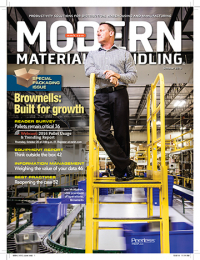60 Seconds with Peter Bolstorff: Executive Vice President, Corporate Development at APICS
Peter has 25 years in the supply chain industry including corporate stints with 3M and Imation, a lifetime volunteer with the Supply Chain Council, successful entrepreneur; author of “Supply Chain Excellence;” and two years in an executive role with APICS.
Latest Material Handling News
New resource center for weighing and dimensioning Protective packaging roundup MODEX C-Suite Q&A: Troy Donnelly, Senior VP of Sales, Marketing, and Application, DMW&H When Just-in-Time Just Doesn’t Work Recycling coastline plastic into premium reusable packaging More ColumnsPeter has 25 years in the supply chain industry including corporate stints with 3M and Imation, a lifetime volunteer with the Supply Chain Council, successful entrepreneur; author of “Supply Chain Excellence;” and two years in an executive role with APICS. Duties include overseeing APICS’ for Business platform that includes supply chain talent development and corporate supply chain performance improvement products and services
Modern: Peter, we both just came back from a conference where the talent crisis was a major topic of conversation. What are you hearing from APICS members?
Bolstorff: Based on our research, we know the supply chain talent gap is real. And, based on feedback from our corporate affiliates, there are three areas of concern. The first is at the supply chain manager level with a primary focus on those moving into the role. The discussion centers around how to identify, recruit and develop mid-career high potentials in other disciplines like finance, product management, engineering and IT. The second focuses on retention and job progression at entry-level supply chain jobs. There, the discussion centers on two themes: recruiting young professionals with supply chain degrees and retaining talent to progress them to entry-level manager roles. The third has more to do with up-skilling jobs that impact the supply chain, but aren’t in a direct line of authority. That discussion focuses on roles related to the supply chain in finance, product lifecycle management, sales and marketing, IT, quality and risk management.
Modern: Do you find most companies have strategies in place to address the issue? In other words, does senior management understand what it’s facing? Or, is management assuming that since the lines keep running, it’s all working out?
Bolstorff: There is a spectrum of corporate awareness that follows a pattern similar to a bell curve. Corporate leaders on the far right of the bell curve have recognized that supply chain performance is affected by multiple dimensions of which people play a critical role; they include talent development as part of their overall strategic plans. In contrast, corporate laggards on the far left side of the bell curve still look at supply chain performance in a singular fire-fighting dimension. People are reinforced for putting out fires. Supply chain strategy is defined using the phrase, “throw as many things on the wall as we can and see what sticks,” and talent development rarely sticks. Everyone else is somewhere in the middle.
Modern: APICS recently introduced a logistics and distribution certification. What will it entail and how will it prepare the certificate holder?
Bolstorff: The new APICS Certified in Logistics, Transportation and Distribution (CLTD) designation was launched in July, and the response has exceeded our expectations. We knew there was a learning gap in this area. Globalization and online commerce have driven an increase in jobs, but there were no strong training programs to build the necessary skills. Similar in structure to the APICS CSCP (Certified in Supply Chain Professional) program, one exam and a self-study courseware system are available. Preparation in a classroom and online learning will be available soon. The CLTD designation exam assesses professionals’ understanding of a comprehensive body of knowledge, best practices and standards related to key activities in logistics, transportation and distribution.
Modern: We often hear that young people aren’t really cognizant of the supply chain until college and by then, they may have chosen other paths. How can we address that?
Bolstorff: It’s true—unless a parent or relative has a job in supply chain, it’s likely that a young person is completely unaware of the career opportunities available for supply chain professionals. The Supply Chain STEM Program is a new educational offering from APICS, focused on presenting supply chain and STEM careers to K-12 students with an aim of reducing the supply chain talent gap. The program includes age-appropriate, fun, hands-on, interactive activities to teach students about key science, technology, engineering, math (STEM) concepts and how they factor into the supply chain. APICS provides the tools and resources for volunteers to deliver the programs in a variety of settings: schools, social organizations, clubs, and community programs. We’ve sparked the interest of many companies who believe their employees would be interested in inspiring future generations of supply chain leaders.

Article Topics
Columns News & Resources
New resource center for weighing and dimensioning Protective packaging roundup MODEX C-Suite Q&A: Troy Donnelly, Senior VP of Sales, Marketing, and Application, DMW&H When Just-in-Time Just Doesn’t Work Recycling coastline plastic into premium reusable packaging Fresh food, anyone? RPCs protect in the supply chain Why Isn’t Your Loading Dock Connected to Your Supply Chain? More ColumnsLatest in Materials Handling
Registration open for Pack Expo International 2024 Walmart chooses Swisslog AS/RS and software for third milk processing facility NetLogistik partners with Vuzix subsidiary Moviynt to offer mobility solutions for warehouses Materials Handling Robotics: The new world of heterogeneous robotic integration BSLBATT is looking for new distributors and resellers worldwide Lucas Watson appointed CSO for Körber’s Parcel Logistics business in North America Hyster recognizes Dealers of Distinction for 2023 More Materials HandlingSubscribe to Materials Handling Magazine

Find out what the world's most innovative companies are doing to improve productivity in their plants and distribution centers.
Start your FREE subscription today.
April 2024 Modern Materials Handling

Latest Resources











